Reports & Resources
Access ENACT’s comprehensive collection of reports, publications, and resources that highlight our commitment to Nature-based Solutions (NbS) and climate transformation. Our materials provide insights into our initiatives, achievements, and the global impact of our work.
Key Publications
ENACT Partnership
NbS 2025 Accelerator Pathways Report
Advancing systemic transformation through Nature-based Solutions for climate change.
View
ENACT Partnership NbS 2024 Discussion Paper
Key messages for
UNCCD COP16
View
Resources
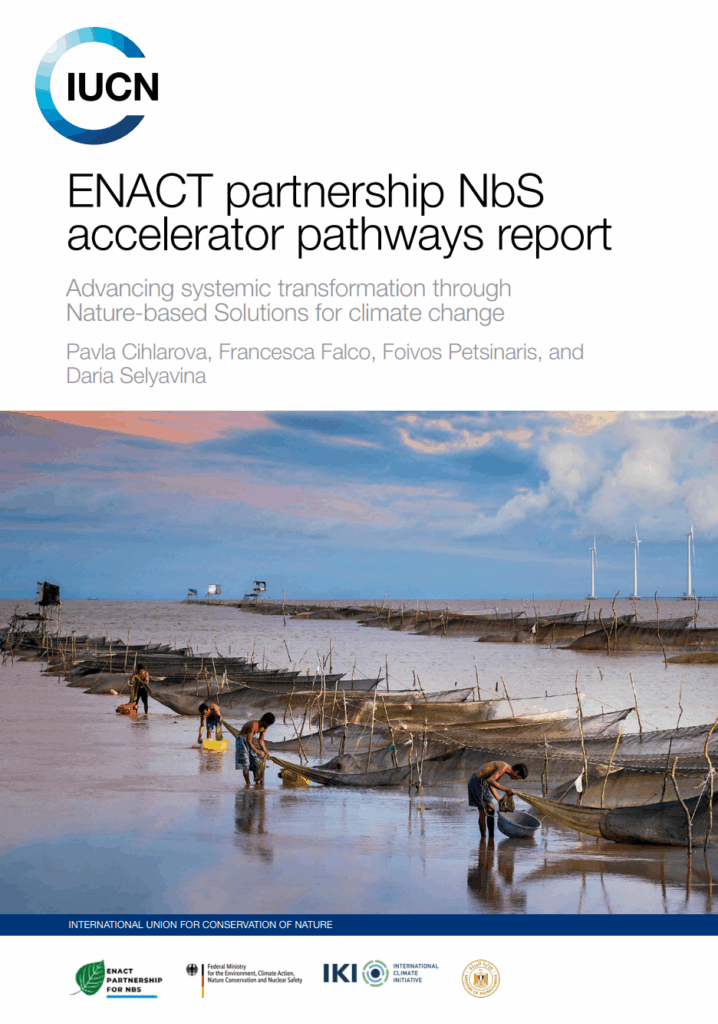
ENACT partnership NbS accelerator pathways report: Advancing systemic transformation through Nature-based Solutions for climate change
This report anchors NbS as a foremost approach to drive transformation across society, addressing interwoven global crises and restoring our relationship with nature. Drawing on scientific and policy advancements, insights from ENACT partners and global NbS leaders, and analysis of mature and scaling NbS initiatives across different systems and geographies, this report explores the core enablers to scale up NbS. It also presents system-specific acceleration pathways across six implementation domains – all framed under a set of key tenets for enhancing the transformative potential of NbS.
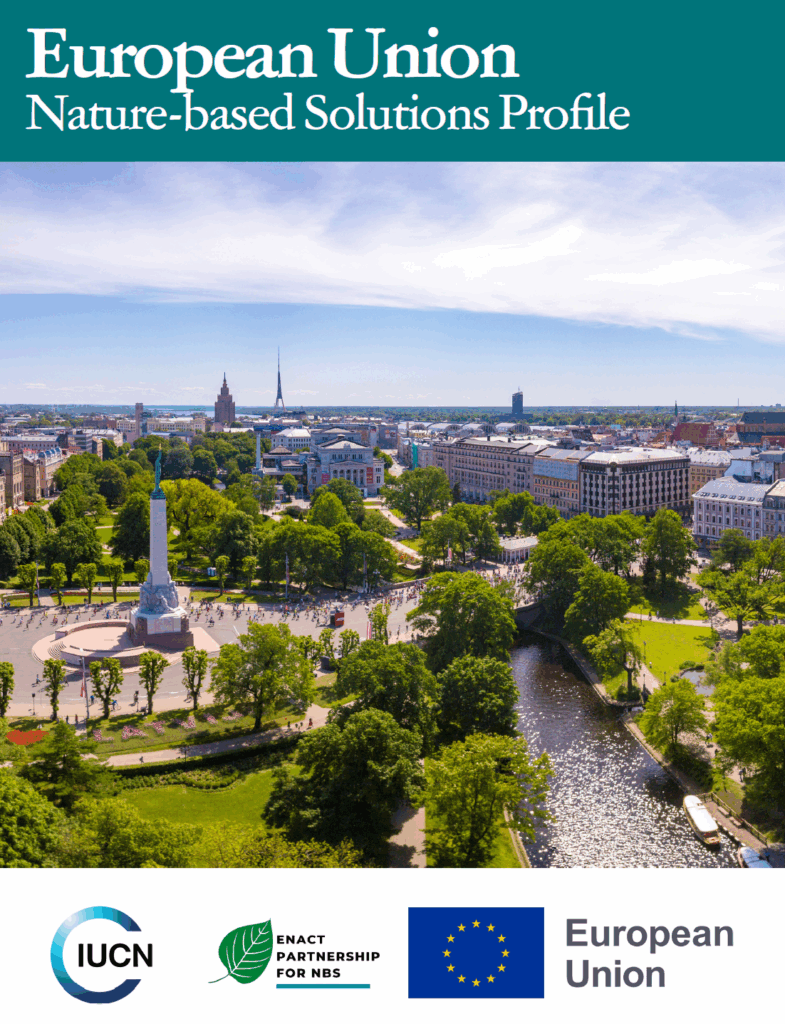
ENACT NbS Profile European Union
This nature-based solutions (NbS) profile provides a summary of the available information on
NbS-related policies, financing, and governance in the context of the European Union. It has been compiled using data from peer-reviewed academic literature, official government publications, and documentation produced by international non-governmental organisations. This profile is not intended to be exhaustive, and readers are encouraged to consult additional sources for more comprehensive information. Profiles will be updated by the ENACT Secretariat in collaboration with the ENACT partner on an annual basis to ensure information remains current.
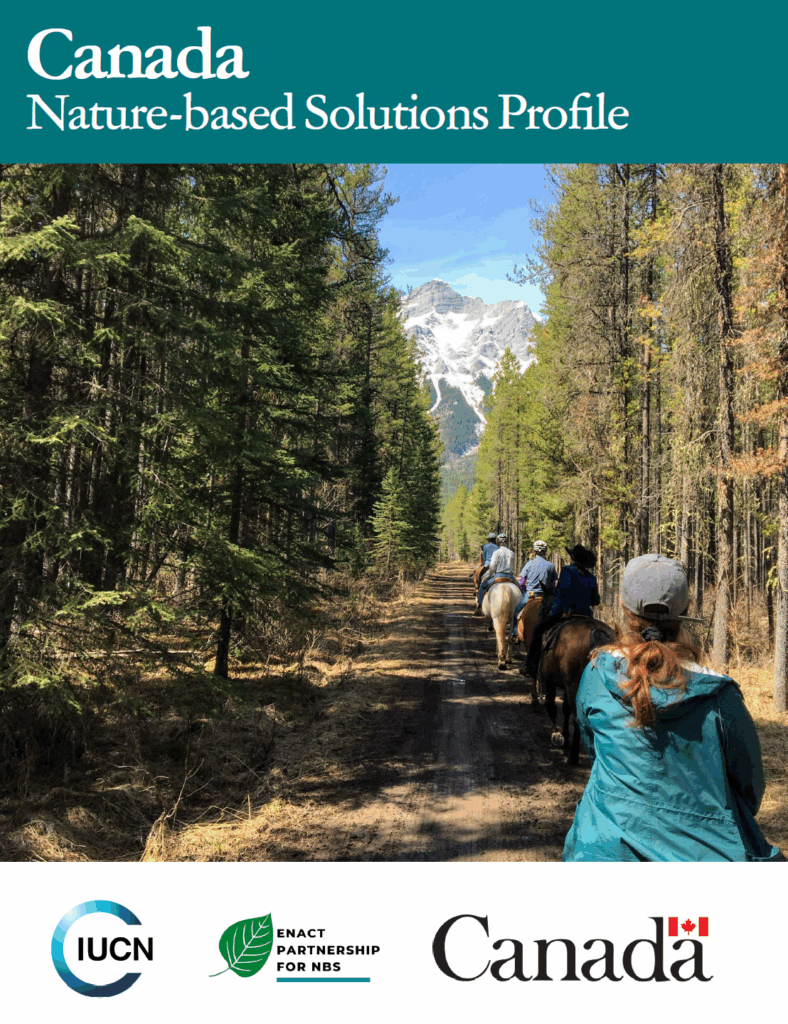
ENACT NbS Profile Canada
This nature-based solutions (NbS) profile provides a summary of the available information on
NbS-related policies, financing, and governance in the context of Canada. It has been compiled using data from peer-reviewed academic literature, official government publications, and documentation produced by international non-governmental organisations. This profile is not intended to be exhaustive, and readers are encouraged to consult additional sources for more comprehensive information. Profiles will be updated by the ENACT Secretariat in collaboration with the ENACT partner on an annual basis to ensure information remains current.
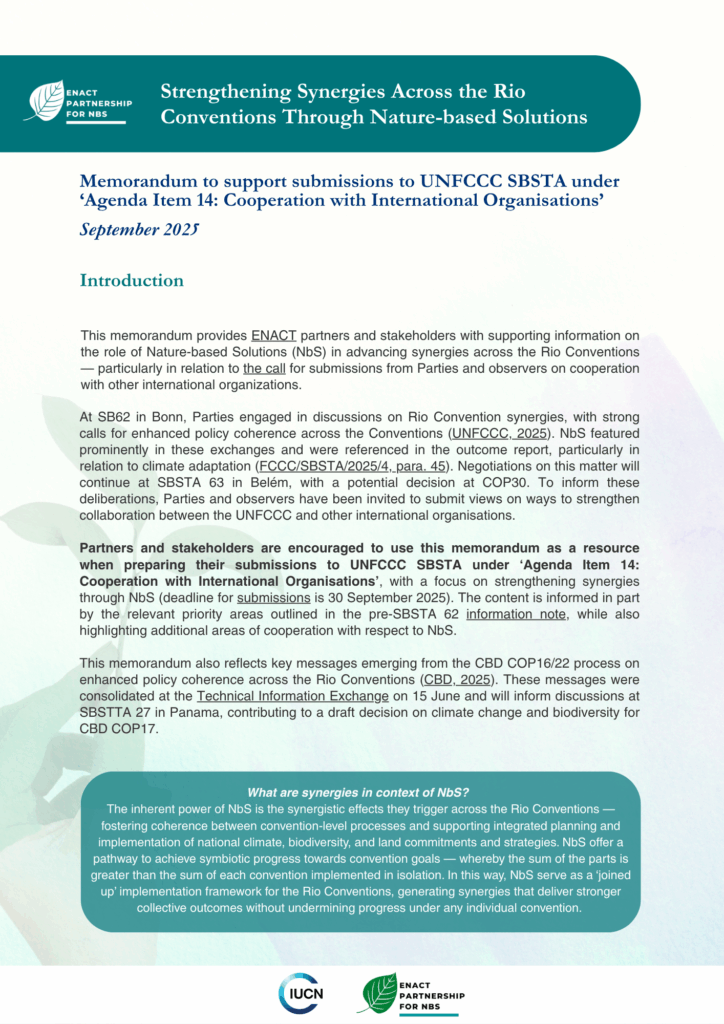
Strengthening Synergies Across the Rio Conventions Through Nature-based Solutions
Memorandum to support submissions to UNFCCC SBSTA under ‘Agenda Item 14: Cooperation with International Organisations’ – September 2025
This memorandum provides ENACT partners and stakeholders with supporting information on the role of Nature-based Solutions (NbS) in advancing synergies across the Rio Conventions — particularly in relation to the call for submissions from Parties and observers on cooperation with other international organizations.
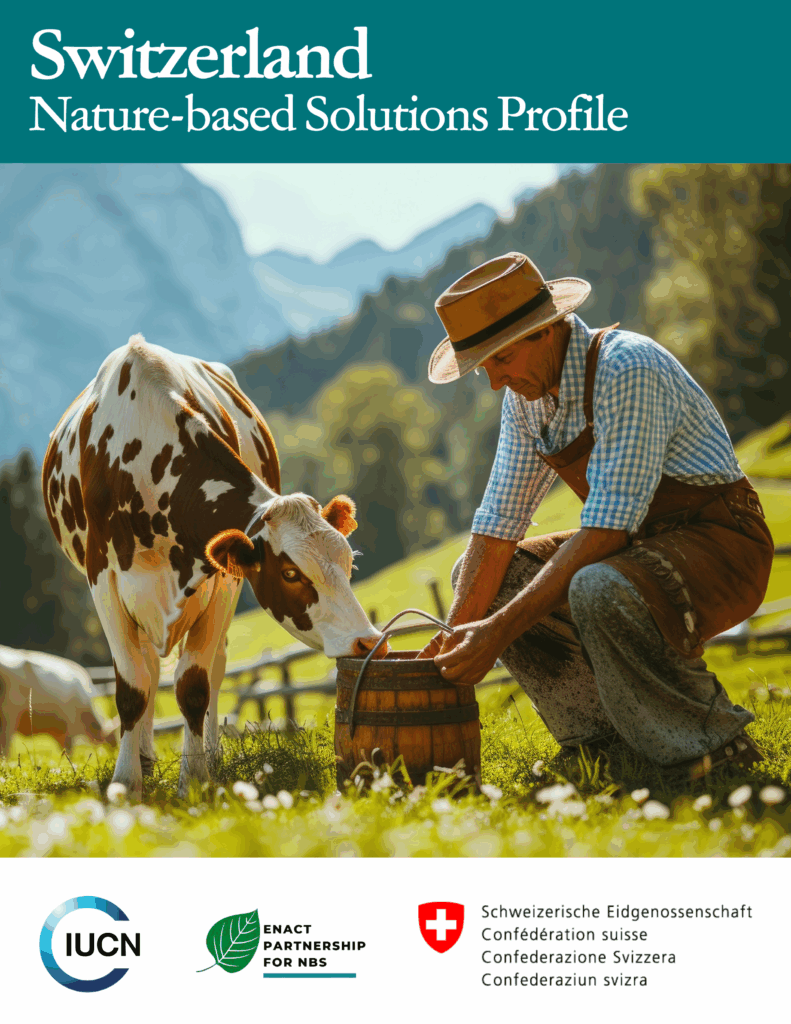
ENACT NbS Profile Switzerland
This nature-based solutions (NbS) profile provides a summary of the available information on
NbS-related policies, financing, and governance in the context of Switzerland. It has been compiled using data from peer-reviewed academic literature, official government publications, and documentation produced by international non-governmental organisations. This profile is not intended to be exhaustive, and readers are encouraged to consult additional sources for more comprehensive information. Profiles will be updated by the ENACT Secretariat in collaboration with the ENACT partner on an annual basis to ensure information remains current.
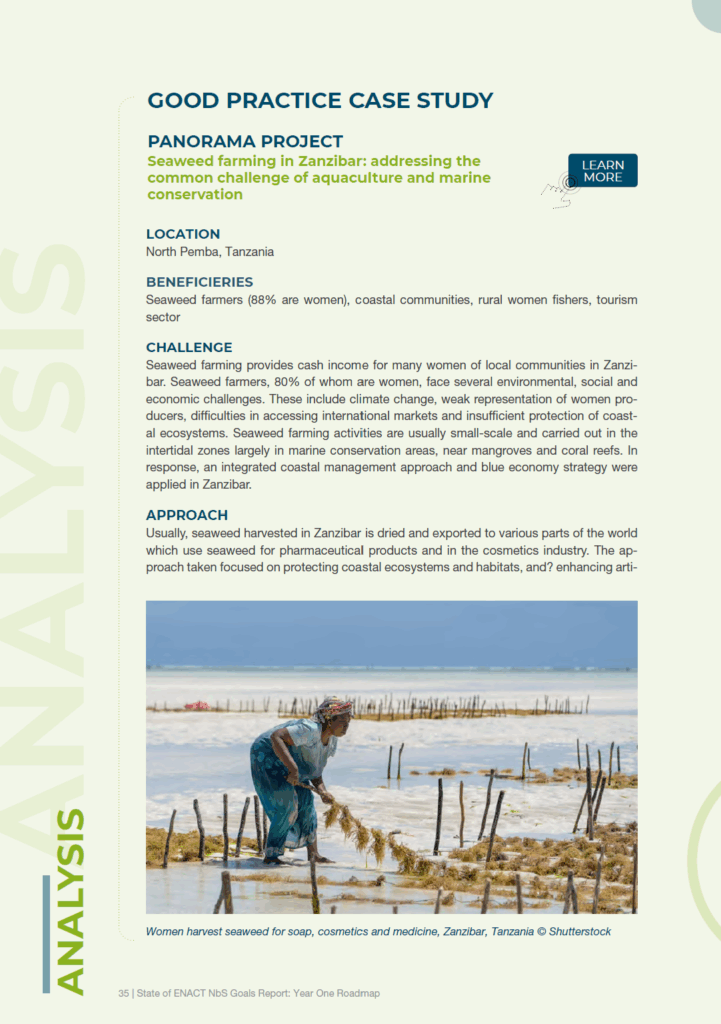
ENACT 2024 Case Study: Seaweed farming in Zanzibar – addressing the common challenge of aquaculture and marine conservation
Seaweed farming provides cash income for many women of local communities in Zanzibar. Seaweed farmers, 80% of whom are women, face several environmental, social and economic challenges. These include climate change, weak representation of women producers, difficulties in accessing international markets and insufficient protection of coastal ecosystems. Seaweed farming activities are usually small-scale and carried out in the intertidal zones largely in marine conservation areas, near mangroves and coral reefs. In response, an integrated coastal management approach and blue economy strategy were applied in Zanzibar.
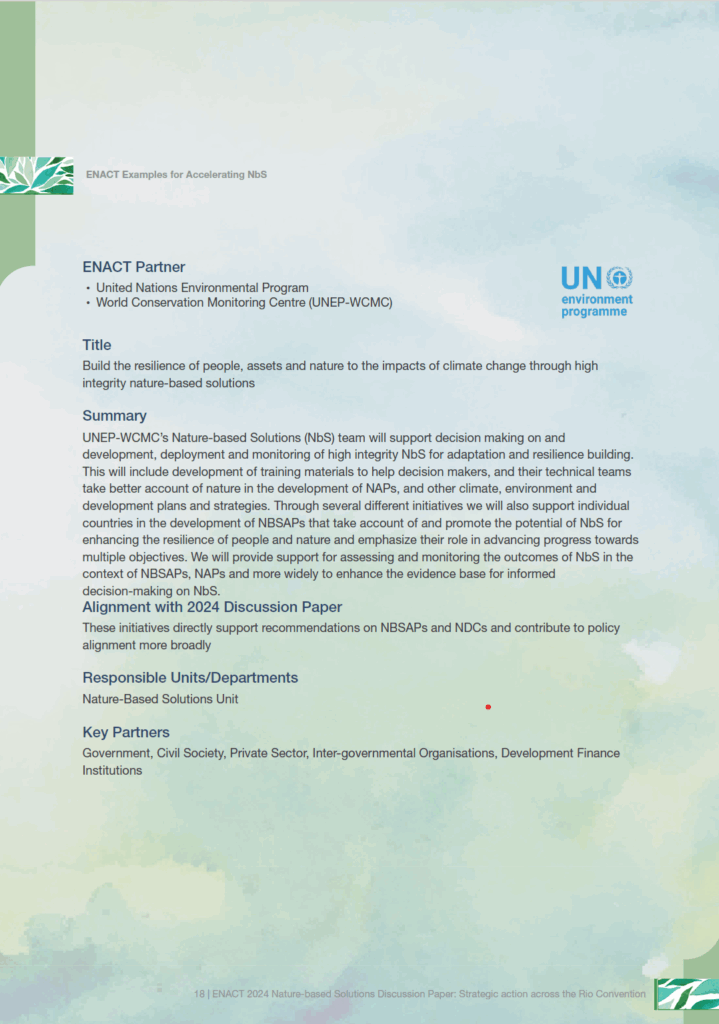
ENACT 2024 Case Study: Build the resilience of people, assets and nature to the impacts of climate change through high integrity nature-based solutions (UNEP-WCMC)
UNEP-WCMC’s Nature-based Solutions (NbS) team will support decision making on and development, deployment and monitoring of high integrity NbS for adaptation and resilience building. This will include development of training materials to help decision makers, and their technical teams take better account of nature in the development of NAPs, and other climate, environment and development plans and strategies. Through several different initiatives we will also support individual countries in the development of NBSAPs that take account of and promote the potential of NbS for enhancing the resilience of people and nature and emphasize their role in advancing progress towards multiple objectives. We will provide support for assessing and monitoring the outcomes of NbS in the context of NBSAPs, NAPs and more widely to enhance the evidence base for informed decision-making on NbS.
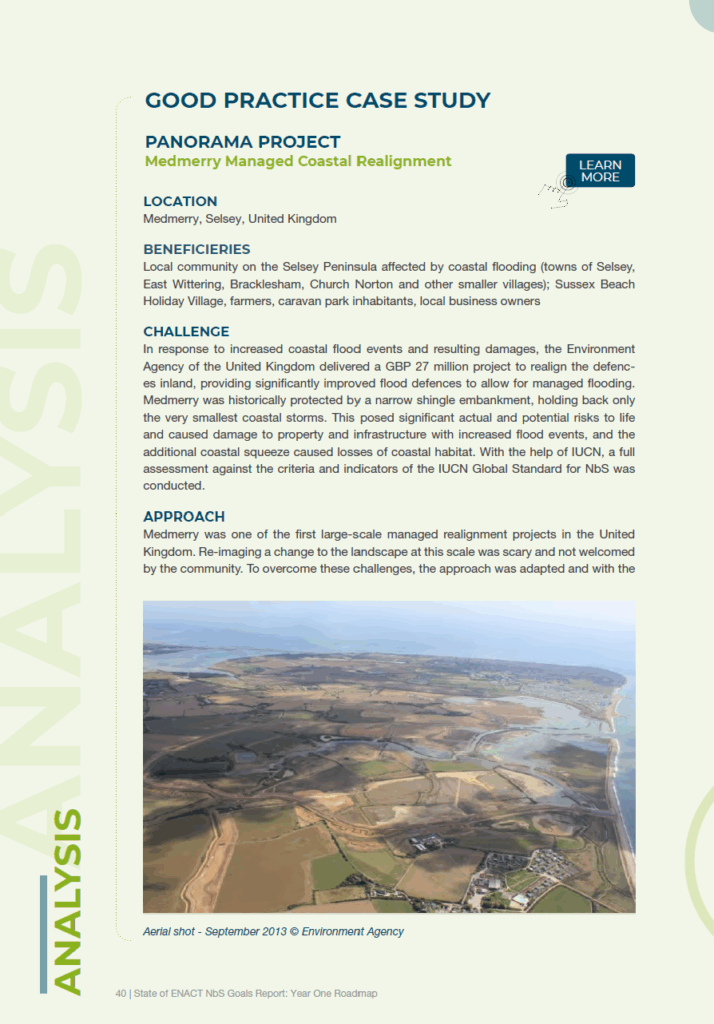
ENACT 2024 Case Study: Medmerry Managed Coastal Realignment (United Kingdom)
In response to increased coastal flood events and resulting damages, the Environment Agency of the United Kingdom delivered a GBP 27 million project to realign the defences inland, providing significantly improved flood defences to allow for managed flooding. Medmerry was historically protected by a narrow shingle embankment, holding back only the very smallest coastal storms. This posed significant actual and potential risks to life and caused damage to property and infrastructure with increased flood events, and the additional coastal squeeze caused losses of coastal habitat. With the help of IUCN, a full assessment against the criteria and indicators of the IUCN Global Standard for NbS was
conducted.
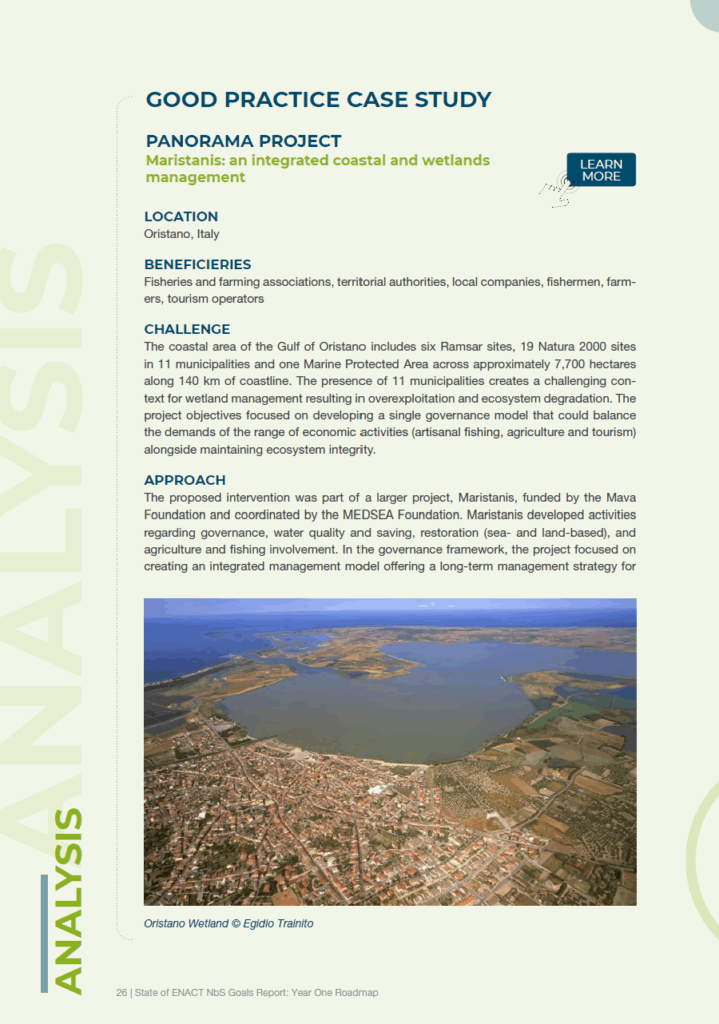
ENACT 2024 Case Study: Maristanis, Italy: An integrated coastal and wetlands management
The coastal area of the Gulf of Oristano includes six Ramsar sites, 19 Natura 2000 sites in 11 municipalities and one Marine Protected Area across approximately 7,700 hectares along 140 km of coastline. The presence of 11 municipalities creates a challenging context for wetland management resulting in overexploitation and ecosystem degradation. The project objectives focused on developing a single governance model that could balance the demands of the range of economic activities (artisanal fishing, agriculture and tourism) alongside maintaining ecosystem integrity.
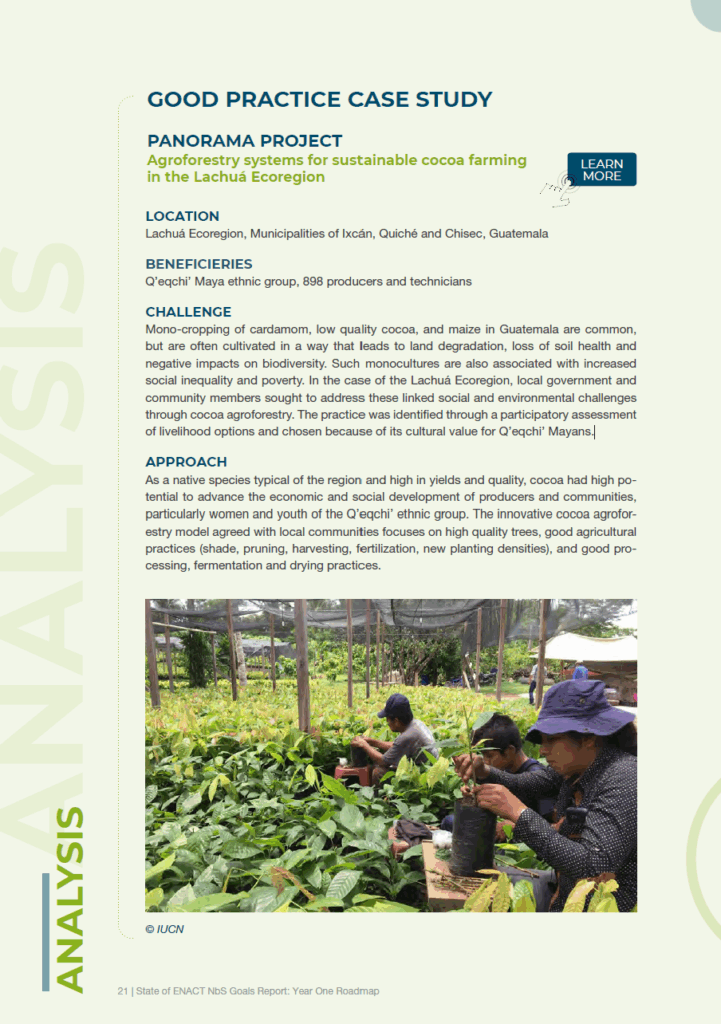
ENACT 2024 Case Study: Agroforestry systems for sustainable cocoa farming in the Lachuá Ecoregion, Guatemala
Mono-cropping of cardamom, low quality cocoa, and maize in Guatemala are common, but are often cultivated in a way that leads to land degradation, loss of soil health and negative impacts on biodiversity. Such monocultures are also associated with increased social inequality and poverty. In the case of the Lachuá Ecoregion, local government and
community members sought to address these linked social and environmental challenges through cocoa agroforestry. The practice was identified through a participatory assessment of livelihood options and chosen because of its cultural value for Q’eqchi’ Mayans.
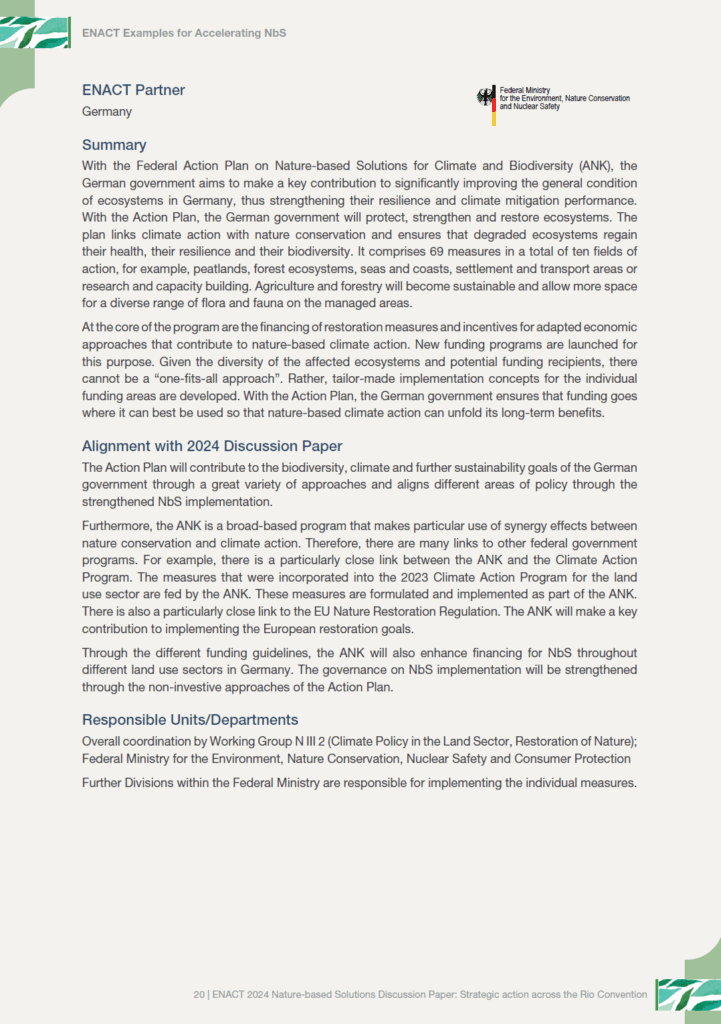
ENACT 2024 Case Study: Germany Federal Action Plan on Nature-based Solutions for Climate and Biodiversity
With the Federal Action Plan on Nature-based Solutions for Climate and Biodiversity (ANK), the German government aims to make a key contribution to significantly improving the general condition of ecosystems in Germany, thus strengthening their resilience and climate mitigation performance. With the Action Plan, the German government will protect, strengthen and restore ecosystems. The plan links climate action with nature conservation and ensures that degraded ecosystems regain their health, their resilience and their biodiversity. It comprises 69 measures in a total of ten fields of action, for example, peatlands, forest ecosystems, seas and coasts, settlement and transport areas or research and capacity building. Agriculture and forestry will become sustainable and allow more space for a diverse range of flora and fauna on the managed areas.
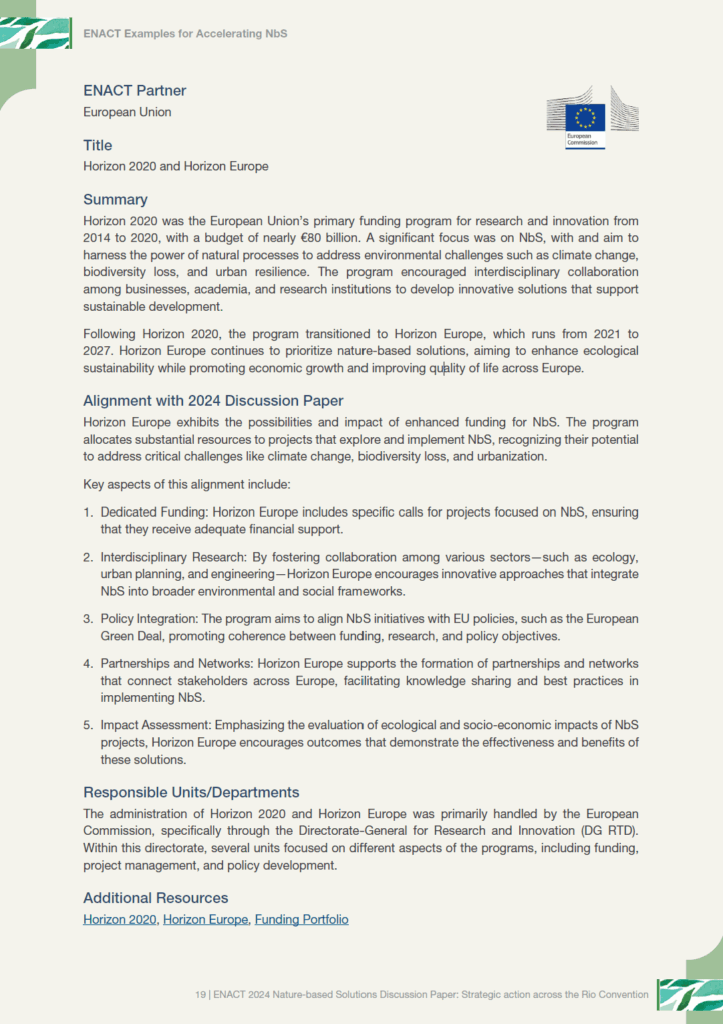
ENACT 2024 Case Study: Horizon 2020 and Horizon Europe (European Union)
Horizon 2020 was the European Union’s primary funding program for research and innovation from 2014 to 2020, with a budget of nearly €80 billion. A significant focus was on NbS, with and aim to harness the power of natural processes to address environmental challenges such as climate change, biodiversity loss, and urban resilience. The program encouraged interdisciplinary collaboration among businesses, academia, and research institutions to develop innovative solutions that support sustainable development. Following Horizon 2020, the program transitioned to Horizon Europe, which runs from 2021 to 2027. Horizon Europe continues to prioritize nature-based solutions, aiming to enhance ecological sustainability while promoting economic growth and improving quality of life across Europe.
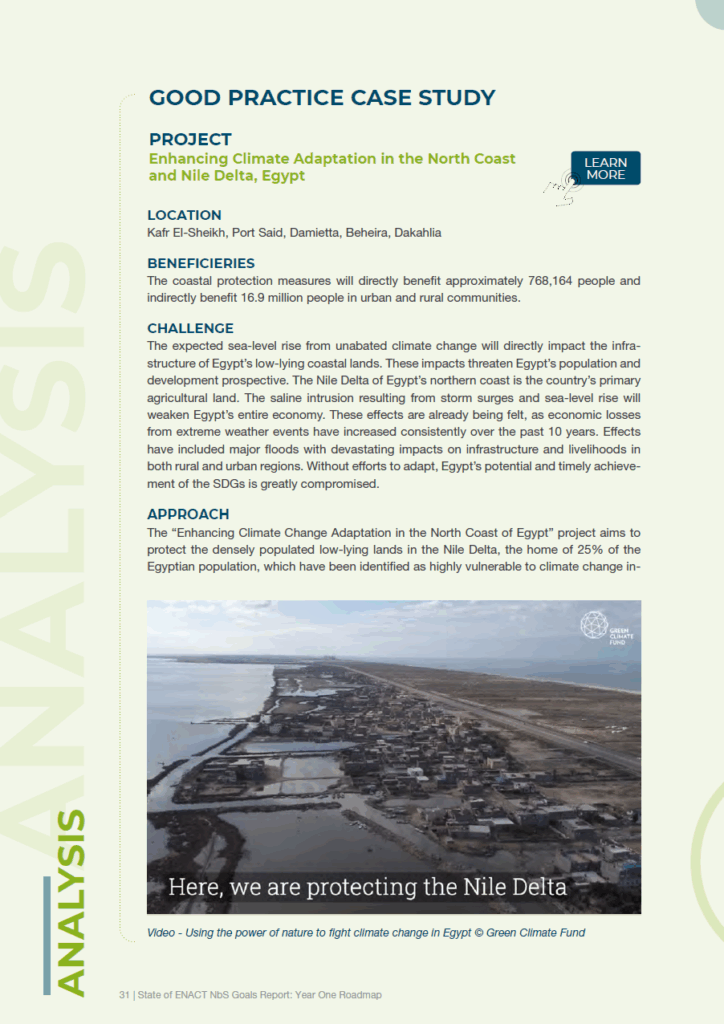
ENACT 2024 Case Study: Enhancing Climate Adaptation in the North Coast and Nile Delta, Egypt
The “Enhancing Climate Change Adaptation in the North Coast of Egypt” project aims to protect the densely populated low-lying lands in the Nile Delta, the home of 25% of the Egyptian population, which have been identified as highly vulnerable to climate change induced sea-level rise. The project is implemented by the Ministry of Water Resources and Irrigation with a total budget of USD 31.4 million from the Green Climate Fund (GCF) through the United Nations Development Programme (UNDP) as Accredited Agency, over seven years in addition to co-financing from the Government of Egypt. The project is coordinated by the Ministry of Environment.
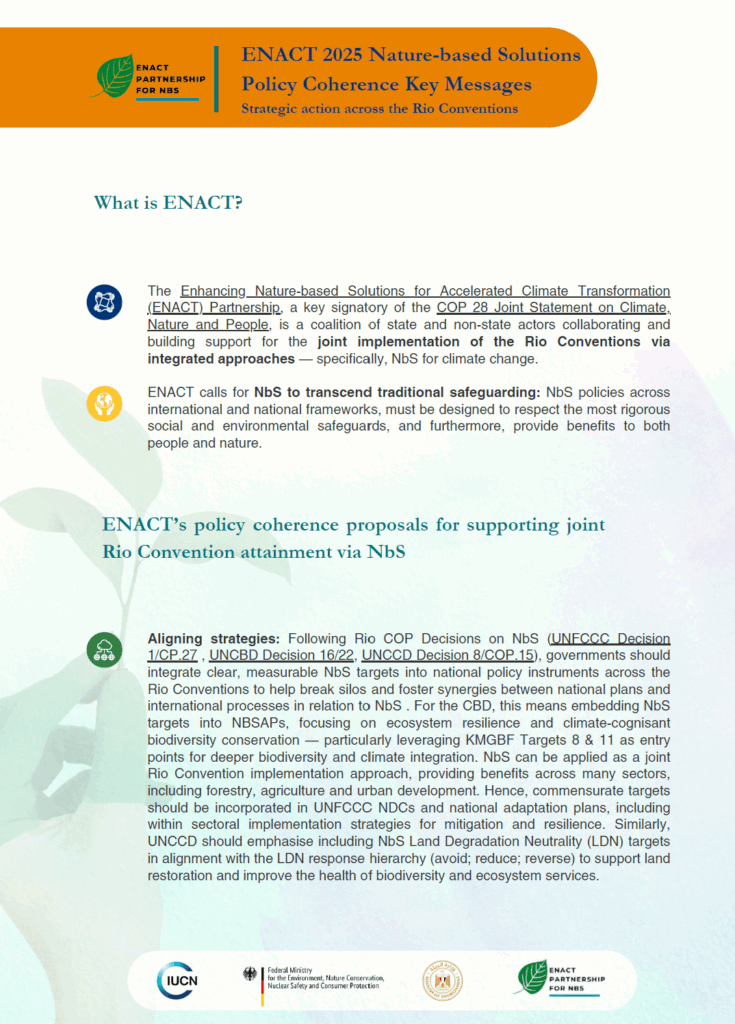
ENACT NbS 2025: Policy Coherence Key Messages
ENACT calls for NbS to transcend traditional safeguarding: NbS policies across international and national frameworks, must be designed to respect the most rigorous social and environmental safeguards, and furthermore, provide benefits to both people and nature. This document introduces ENACT’s policy coherence proposals for supporting joint Rio Convention attainment via NbS as well as its programmatic activities supporting policy coherence.
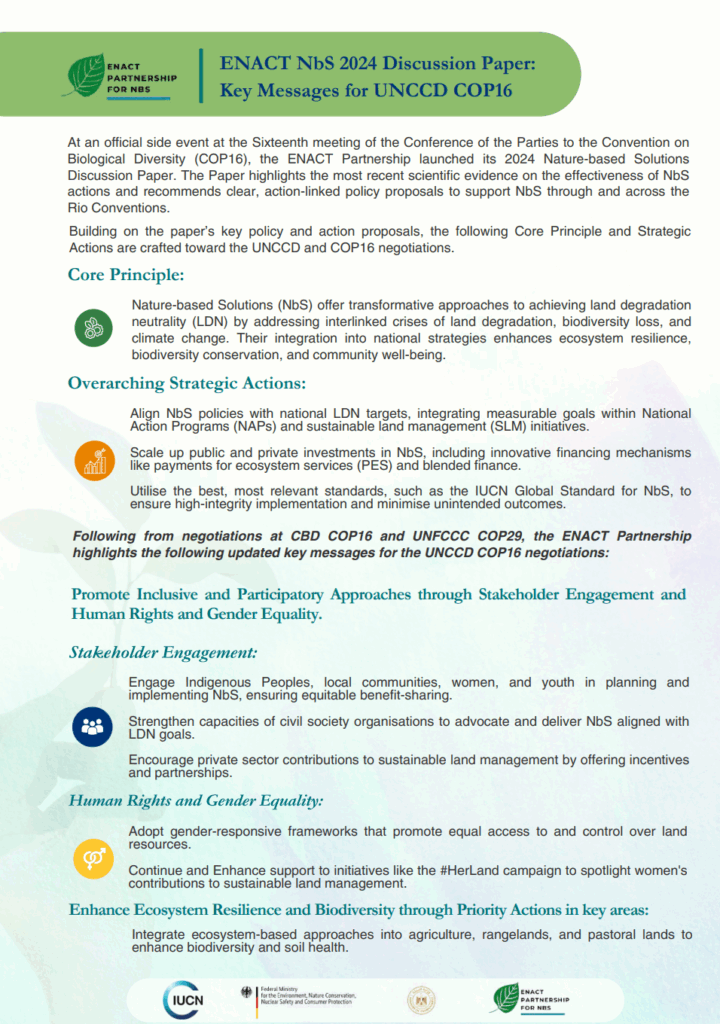
ENACT NbS 2024 Discussion Paper: Key Messages for UNCCD COP16
At an official side event at the Sixteenth meeting of the Conference of the Parties to the Convention on Biological Diversity (COP16), the ENACT Partnership launched its 2024 Nature-based Solutions Discussion Paper. The Paper highlights the most recent scientific evidence on the effectiveness of NbS actions and recommends clear, action-linked policy proposals to support NbS through and across the Rio Conventions. Building on the paper’s key policy and action proposals, this document contains Core Principle and Strategic Actions crafted toward the UNCCD and COP16 negotiations.
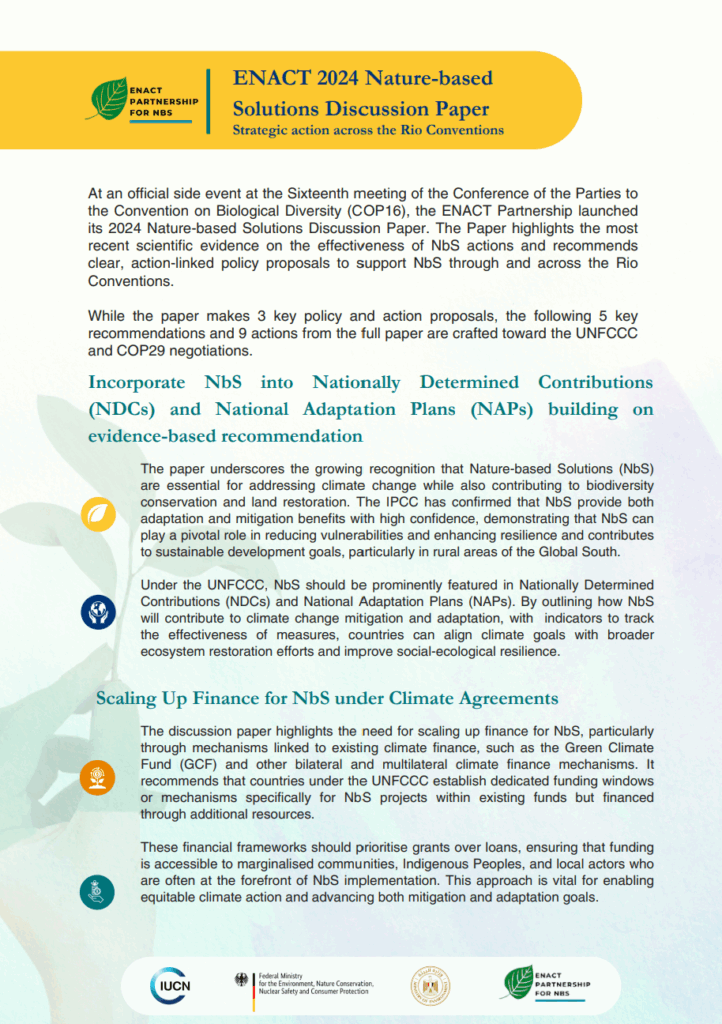
ENACT 2024 Nature-based Solutions Discussion Paper Key Messages
At an official side event at the Sixteenth meeting of the Conference of the Parties to the Convention on Biological Diversity (COP16), the ENACT Partnership launched its 2024 Nature-based Solutions Discussion Paper. This Paper highlights the most recent scientific evidence on the effectiveness of NbS actions and recommends clear, action-linked policy proposals to support NbS through and across the Rio Conventions.
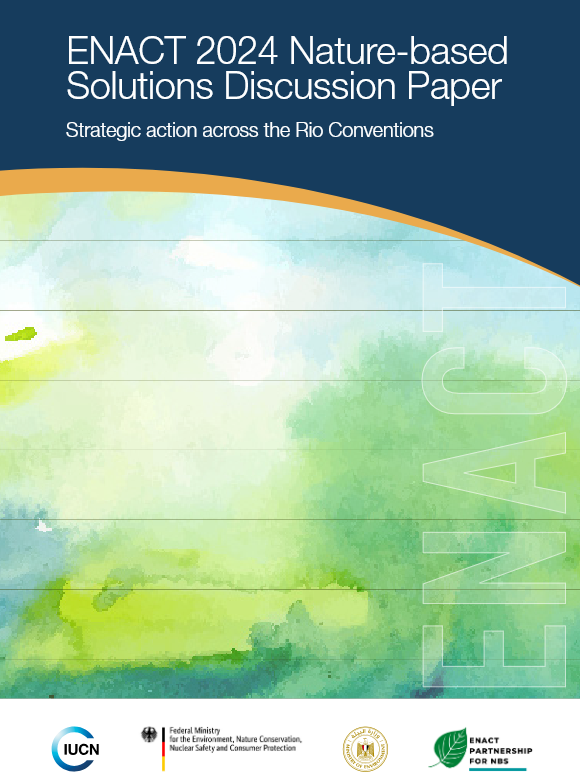
ENACT 2024 Nature-based Solutions Discussion Paper
The ENACT 2024 NbS Discussion Paper synthesises recent scientific findings on NbS, highlighting their capacity to provide significant adaptation and mitigation benefits.
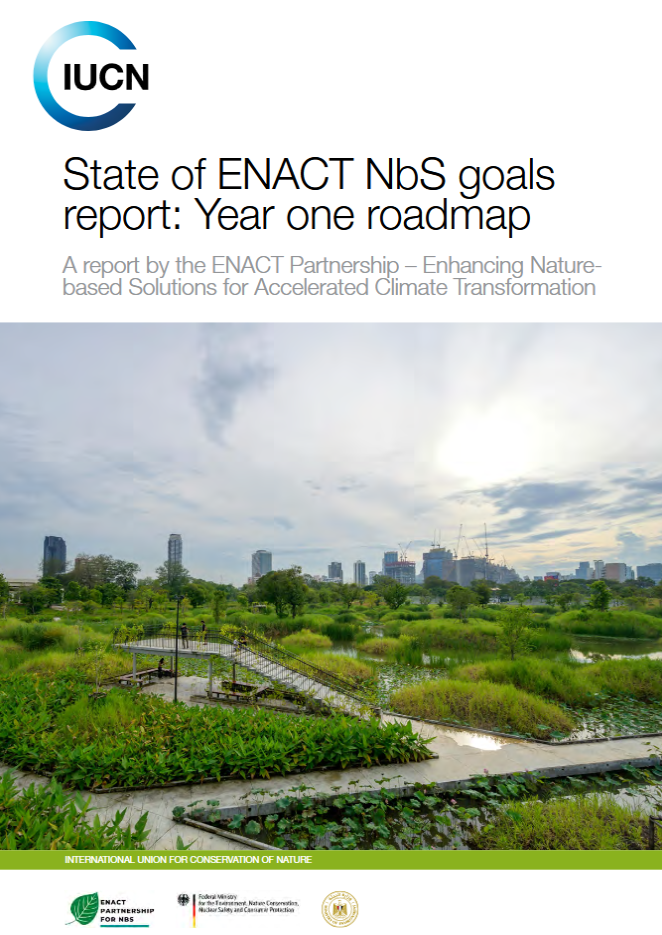
State of ENACT NbS Goals Report: Year One Roadmap
As part of the official side events of the 6th session of the United Nations Environment Assembly, the ENACT Partnership launched its inaugural report. The report – State of ENACT NbS Goals Report: Year One Roadmap – details a baseline of current knowledge on the ENACT NbS Goals and highlights ENACT partners’ success in applying NbS to key ENACT NbS workstreams.
